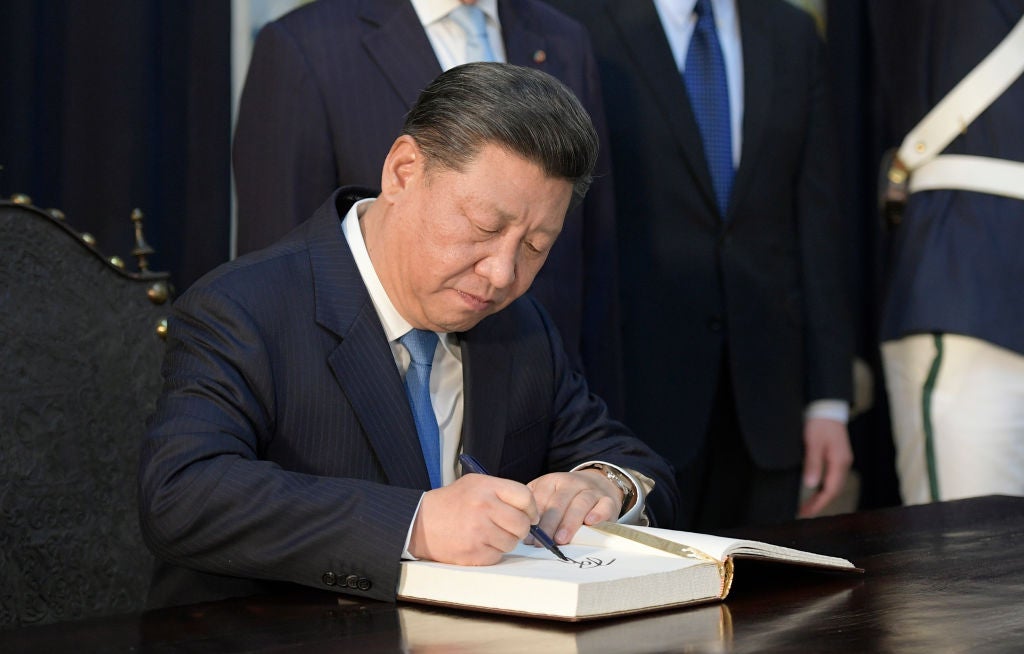
President Xi Jinping has called on China to improve its digital economy, in a think piece published over the weekend. Xi’s vision sets out a technological blueprint for China after a year of heavy-handed tech intervention from Beijing.
Saturday saw the publication of Xi’s essay in the Qiushi Journal, a political theory magazine from the Communist Party’s Central Committee. In it, China’s leader writes: “My country’s digital economy is big but not strong, fast but of poor quality.
“It should also be noted that in the rapid development of my country’s digital economy, there are also some unhealthy and irregular signs and trends,” Xi adds.
“These problems not only affect the healthy development of the digital economy, but also violate laws and regulations and pose a threat to the national economic and financial security, which must be resolutely corrected.”
Also in the essay, titled “Continue to strengthen and optimize my country’s digital economy”, Xi describes big data, artificial intelligence (AI) and 5G as essential components to “build a digital China and a smart society.”
A “healthy” digital economy for China
Offering a rare personal view from the Chinese leader, the essay comes after a year defined, in Chinese tech, by heavy crackdowns from Beijing.
How well do you really know your competitors?
Access the most comprehensive Company Profiles on the market, powered by GlobalData. Save hours of research. Gain competitive edge.

Thank you!
Your download email will arrive shortly
Not ready to buy yet? Download a free sample
We are confident about the unique quality of our Company Profiles. However, we want you to make the most beneficial decision for your business, so we offer a free sample that you can download by submitting the below form
By GlobalData2021 saw Chinese authorities clamp down on online fan clubs, bitcoin mining, the budding edtech industry and the power of big online tech companies.
As Verdict reported last year, almost every big name in Chinese tech was grilled for antitrust violations, including Alibaba, Tencent (gaming), Meituan (food delivery), Didi Chuxing (ride-hailing), Baidu (search), ByteDance (social media) and JD.com (ecommerce).
While not referring directly to these examples of state intervention, Xi’s essay describes Beijing’s actions as vital to the “healthy development of the digital economy.
“It is necessary to adhere to both the promotion of development and regulation, and to be strict in both, and to regulate and develop in the process of development,” Xi warns. “It is necessary to correct and standardise behaviours and practices that harm the interests of the masses and hinder fair competition in the development process, prevent platform monopoly and disorderly expansion of capital, and investigate and punish acts of monopoly and unfair competition in accordance with the law.”
”Xi is making clear that the great rebalancing of the Chinese economy remains an urgent work in progress,” Michael Orme, senior analyst at GlobalData and China specialist, tells Verdict. “His wording is telling. Chinese tech is ‘big but not strong: fast but not superior.’
“While Shenzhen is a consumer electronics powerhouse, China has nowhere to match Silicon Valley, Austin, Boston or Tel Aviv in terms of the quality and scale of human resource involved in developing advanced semiconductor technology or intelligent hardware without which China can be neither strong nor superior.
“What China does have a matchless trove of machine readable data and world beating 5G technology with 6G in sight to move that data around at warp speed,” Orme believes.
“At base, Xi is saying that China must shift the best and brightest mathematicians and scientists from working in downstream internet companies to upstream hardware operations and beef up university electronics and materials science faculties. A constructive ‘expansion of capital’ and focus of human resource is needed.”
China’s economy is expected to grow by 5.5% in 2022, according to GlobalData forecasts.







